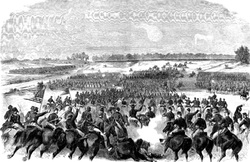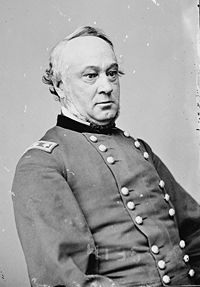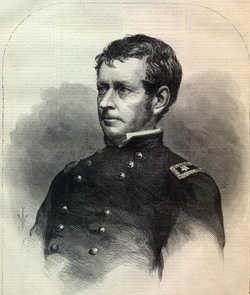
Hooker’s own morale was at an all time low and knew that there were motions in Washington to replace him. He had to make the best of the time that he had. He never forgot the way in which he found himself in command of the army; he personally told the President certain things about Burnside that he was displeased with. But Burnside was displeased with him during the Fredericksburg Campaign. During the end of the year 1862, Burnside created what was called Special Order Number 8 which would terminate eight generals: Brooks, Newton, Cochrane, Franklin, Smith, Sturgis, Ferraro, and Hooker. Burnside himself even said that he could not “continue to command unless order number 8 met with approval.”[6] Order number 8 never made its appearance and Burnside was removed only to be replaced by Hooker. Lincoln himself wrote the report to Hooker placing him in command which solely states why he promoted him to the command of the army. “…yet I think it best for you to know that there are some things in regard to which I am not quite satisfied with you…You are ambitious, which, within reasonable bounds, does good rather than harm; but I think that during General Burnside’s command of the army, you have taken counsel of your ambition, and thwarted him as much as you could, in which you did a great wrong to the country and to a most meritorious and honorable brother officer…Of course it was not for this, but in spite of it, that I have given you command.”[7] It is a very Machiavellian thing to use counsel with one another to bring another down and now, it seems that the same is happening to Hooker. Now that Hooker was being placed on a tight leash with Halleck, and Lincoln out of the picture, there were motions of some in the high command that were ready to remove him.
Hooker began to analyze the area above the Potomac for places that Lee may attack; he began looking for any town that had military significance. However, Halleck sends a report of information from Pleasonton that Hooker may not know. “I can get no information of the enemy other than that sent to you. Rumors from Pennsylvania are too confused and contradictory to be relied on. Officers and citizens are on a big stampede.”[8] He then goes on to explain that General Schenck is reliable for this type of information. That report was sent on the 18th of June. The reports following all the way to the resignation of Hooker is nothing but a confused mess of reports concerning Schenck and no information concerning the enemy. If Hooker had been allowed to move about as he pleased, he may have found movements of the enemy but the closest he gets is when he moves his headquarters to Frederick, Maryland. But there was one report stating a possible location of Longstreet’s men. “Pleasonton reports Stuart’s force in front of him, beyond Middleburg. He will attack him with all his available command early tomorrow. Their cavalry have mounted infantry with them. Infantry soldiers captured report to Pleasonton that Longstreet’s rear passed through the Blue Ridge yesterday.”[9] According to the period maps, the Blue Ridge Mountains end in Maryland with the edge of South Mountain deep into the Maryland border. The motion of moving through the Blue Ridge would push the men across the Potomac. The report of Longstreet’s men moving through the Blue Ridge came on the 20th of June and two days later, General Pleasonton sends reports to Hooker about encountering the enemy near Upperville which was approximately twenty miles to the border of Maryland. On the 24th of June, Hooker sends a message to Halleck about the enemy and his movements. “Ewell, I conclude, is over the river, and is now up in the country…I shall send over a corps or two from here, in order , if possible, to sever Ewell from the balance of the rebel army, in case he should make a protracted sojourn with his Pennsylvania neighbors.”[10]
It was at this time that Hooker began to meet with the corps commanders and his Chief-of-Staff, Daniel Butterfield as they looked over maps at possible places for an attack. Hooker had a feeling that the target city of the Army of Northern Virginia would be either Hagerstown or Harrisburg but found himself straying his finger towards a small town just above the border. Butterfield remembered later that “Hooker pointed to the vicinity of the town of Gettysburg on a map of Pennsylvania and saying ‘we will fight the battle here.’ Hooker spoke of cutting behind Lee’s army in Pennsylvania and severing his communications. ‘For this reason, I felt that it was for me to say when and where I should fight Lee. I felt that I could choose my position and compel him to attack me.’”[11] But with so much restriction on him, it was difficult to prove where the enemy was and due to the enemy’s cavalry, created a cloud that was more dense than any other. With most of his army concentrated around Westminster, Hanover, and Manchester, Hooker found himself moving towards Harper’s Ferry in a motion to draw the enemy towards him. “I have received you telegram in regard to Harper’s Ferry. I find 10,000 men here, in condition to take the field…No enemy will ever take possession of them…Now they are but a bait for the rebels, should they return.”[12] Later on that day, he filled out his letter of resignation to Halleck who most likely received it with the warmest of hearts.
Though Halleck received it with a great amount of happiness, there was only a few things that Halleck could say in return. “You application to be relieved from your present command is received. As you were appointed to this command by the President, I have no power to relieve you. Your dispatch has been duly referred for Executive action.”[13] And as though they had planned it, a message was written to General Meade giving him command of the army. When Hooker hands in his resignation, there is no remorse as when Lee attempted to resign. Jefferson Davis rejected the resignation and showed some compassion when keeping Lee. When Hooker resigns, it is as if Washington breathes a sigh of relief. Hooker brought a lot of drama to the scene of the high command, but was it necessary to hold him from movement around northern Virginia and Maryland in order to find out about the enemy’s movements? In the second paragraph of promotion of General Meade, Halleck states that he will not micromanage like he had to do with Hooker. “You will not be hampered by any minute instructions from these headquarters. Your army is free to act as you may deem proper under the circumstances as they arise.”[14] One has to wonder whether or not there were political hindrances on the motions between Halleck and Hooker and many felt that it was dangerous move accepting the resignation so close to an oncoming battle. Though Halleck states that Hooker’s resignation has to go before the president, he makes no waste of time replacing him. The report was written of the 27th of June promoting Meade to command of the army but it did not reach him until 3 a.m. on the 28th. As any general would be angry to awaken at that ungodly hour, this news most likely brought him down even more. Meade was a general who found himself both physically present at Gettysburg and physically non-present at the battle. After the campaign is over, Lincoln shows his disappointment with Meade and a council of war is created against him. Many supporters of Hooker approached the council and all stated that a change in command was dangerous for the men in such short of a time.
If Hooker had been allowed to move against Lee when he first had the idea that the enemy was in the north, Gettysburg may have been garrisoned as Hooker had pointed out. Had he been sure of the movements, Halleck may have backed him up; but Hooker’s fame for intelligence and spy networking began to fail him as his head floated up in the high command. As stated before, Halleck and Hooker were dangerous together; to a point that made Lincoln take the back seat to their arguments. We, as historians, can always think about what would have happened if Hooker made his way into Pennsylvania before Lee reached there. Upon reading all of the reports between Hooker, Halleck and Lincoln, the press was very much involved in the presence of the army which Lee would have seen sooner or later. Had Hooker placed himself in a garrison at Gettysburg, Lee would have known, he would have adapted and the Union would have been attacked on another level. Harrisburg may have been an easier target had Hooker placed himself in one spot and had Halleck not been in his position, Hooker’s freedom may have been larger. But since Hooker’s promotion was done with cautious approval, he was on a tight leash from day one. As Burnside was a obedient Golden Retriever who followed everything that Lincoln and the high command wanted, Hooker was an American Bulldog; slow to move and quick to anger, but place it on a leash and it will become obedient.
[1] Ibid, Pg. 42.
[2] Ibid. Pg. 45.
[3] Ibid. Pg. 46.
[4] Ibid. Pg. 47.
[5] Ibid. Pg. 48.
[6] Marvel, William. “Burnside.” Pg. 15.
[7] Lincoln, Abraham. “The Collected Works of Abraham Lincoln. Volume 6” Pg. 78-79.
[8] Official Records of the War of the Rebellion Union and Confederate Armies. Series I. Volume 27, Part 1. Pg. 50-51.
[9] Ibid. Pg. 53.
[10] Ibid. Pg. 55-56.
[11] Sears, Stephen W. “Gettysburg.” Pg. 93.
[12] Official Records of the War of the Rebellion Union and Confederate Armies. Series I. Volume 27 Part 1. Pg. 60.
[13] Ibid. Pg. 60.
[14] Ibid. Pg. 61.


 RSS Feed
RSS Feed
